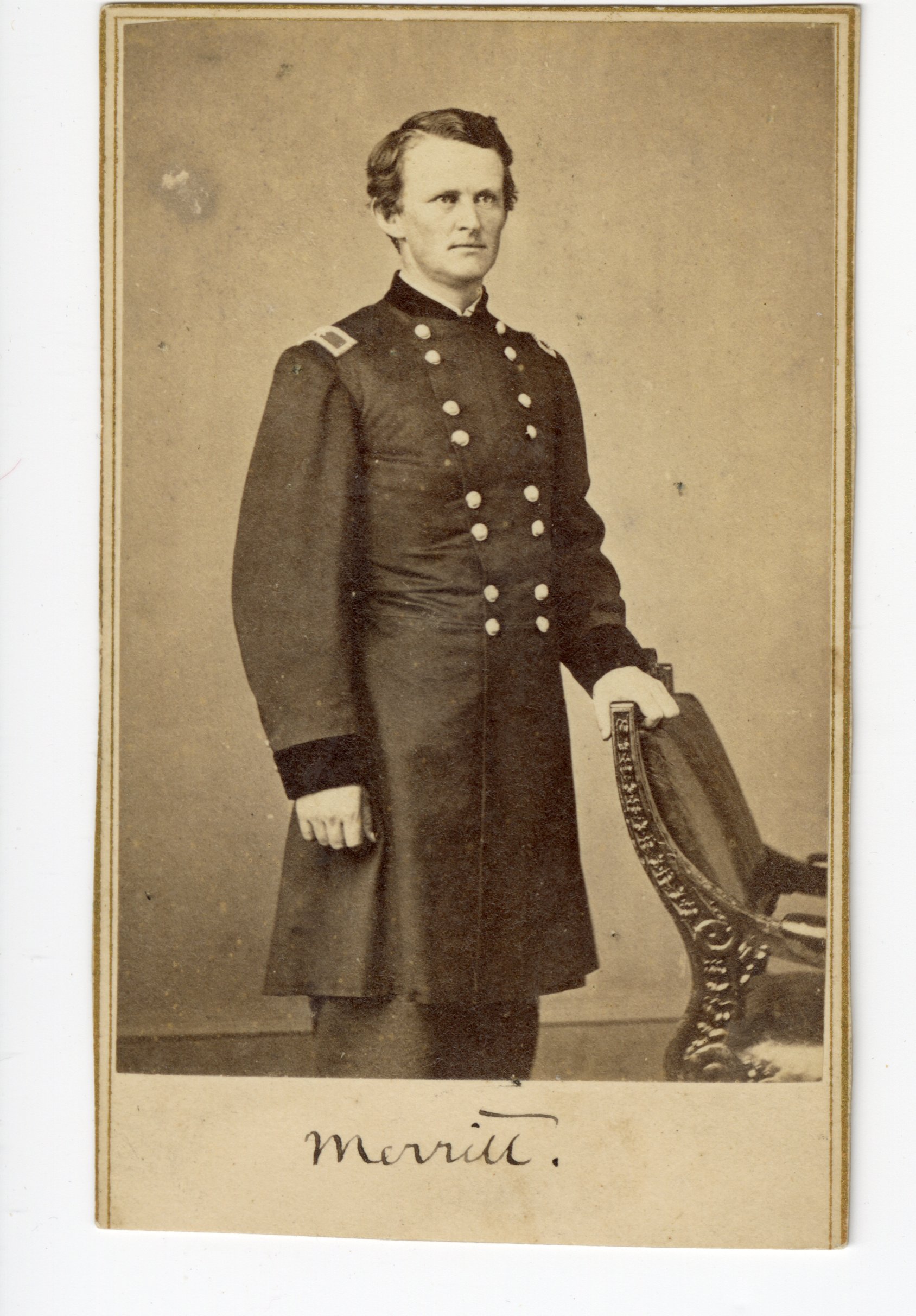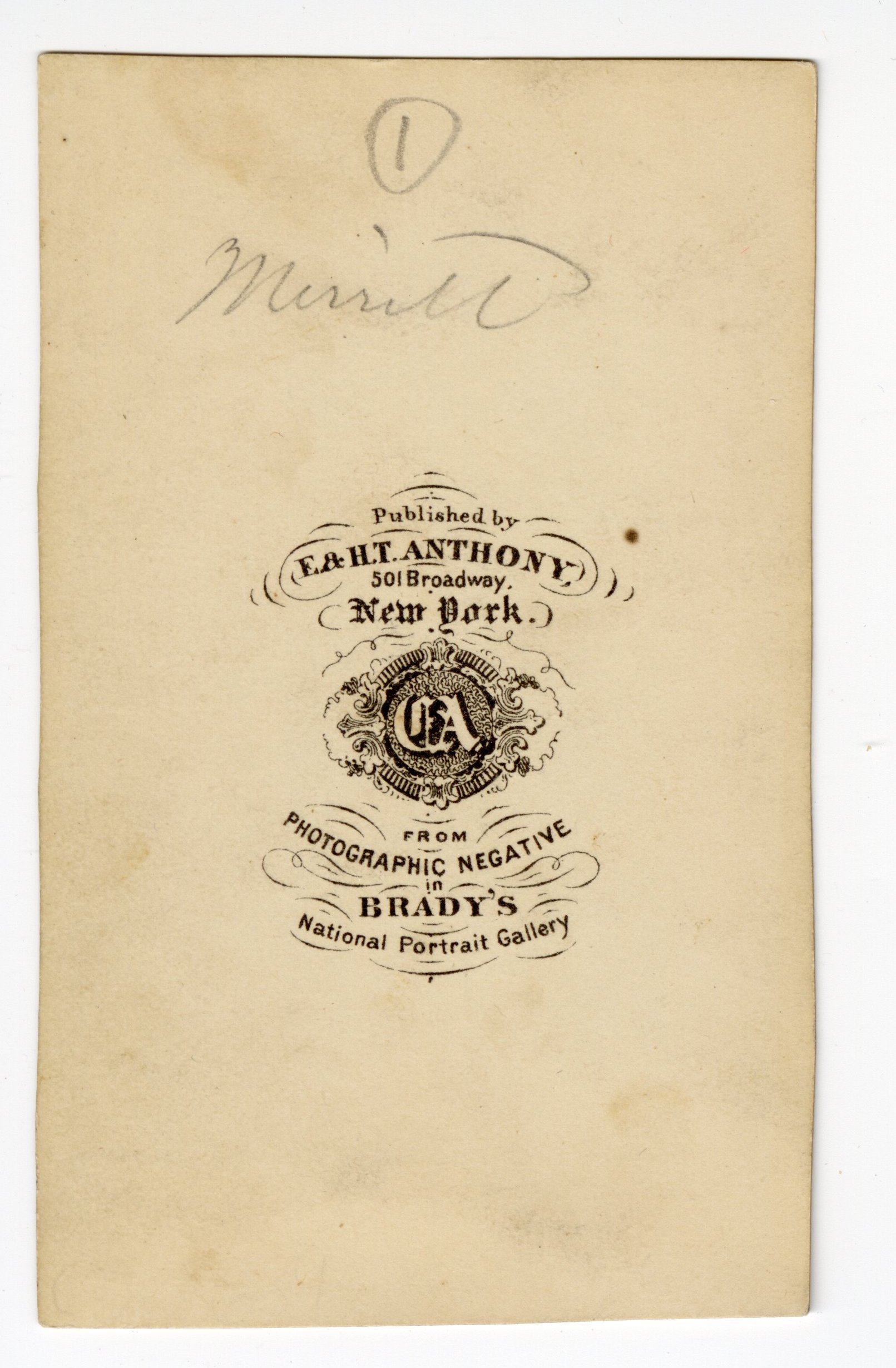Wesley Merritt - Cavalry Brigade Commander at Gettysburg
Item CDV-10865
Price: $375.00
Description
Wesley Merritt (June 16, 1836 – December 3, 1910) was an American major general who served in the cavalry of the United States Army during the American Civil War, American Indian Wars, and Spanish–American War. Following the latter war, he became the first American Military Governor of the Philippines.n 1862, Merritt was appointed captain in the 2nd Cavalry and served as an aide-de-camp to Brig. Gen. Philip St. George Cooke, who commanded the Cavalry Department of the Army of the Potomac. He served in the defenses of Washington, D.C., for the rest of 1862. In 1863, he was appointed adjutant for Maj. Gen. George Stoneman and participated in Stoneman's Raid in the Battle of Chancellorsville in 1863.
He was slightly wounded in the Battle of Brandy Station; on June 29, 1863, he was appointed brigadier general of volunteers for his "gallant and meritorious service" at Brandy Station and Upperville. Being promoted directly from captain to brigadier general was an unusual step, even for the Civil War, but Merritt shared this honor on that date with Captain Elon J. Farnsworth and Captain George Armstrong Custer.
In the Gettysburg Campaign, Merritt commanded the Reserve Brigade, 1st Division, Cavalry Corps of the Army of the Potomac. In the initial cavalry actions of the Battle of Gettysburg, Merritt saw no action; his reserve brigade guarded the lines of communications of the Army of the Potomac. On July 3, 1863, however, he participated in the assault ordered by division commander Brig. Gen. Judson Kilpatrick on the Confederate right flank, following Pickett's Charge. His fellow general, Elon J. Farnsworth, was killed during this futile assault against infantry troops. Merritt took over command of the 1st Division of the Cavalry Corps following the death by typhoid fever of its commander, John Buford, in December 1863. Brig. Gen. Alfred Torbert was the initial commander of the 1st Division but was absent ill for most of Lt. Gen. Ulysses S. Grant's Overland Campaign in 1864, so Merritt acted as commander in his place. He received a brevet promotion to lieutenant colonel in the regular army for his actions at the Battle of Yellow Tavern, the engagement in which Confederate cavalry commander Maj. Gen. J.E.B. Stuart was killed.
During Maj. Gen. Philip Sheridan's Valley Campaigns of 1864, Merritt commanded the 1st Division, Cavalry Corps of the Army of the Shenandoah. Arriving at the opportune moment, his division routed the Confederate forces at the Third Battle of Winchester, a deed for which he received a brevet promotion to major general of the volunteers. Upon his return his Cavalry was deployed across the valley, burning, destroying or taking away everything of value or likely to become of value to the enemy. October 5 his division alone destroyed from Port Republic to Toms Brook 630 barns, 47 mills, 410,742 bushels of wheat, 515 acres of corn not counting private homes. He was second-in-command to Sheridan during the Appomattox Campaign and was one of several commissioners for the surrender at Appomattox Court House. He was brevetted major general in the regular army, in April 1865, for bravery at the Battle of Five Forks and the Appomattox Campaign.
In June 1865, Merritt was appointed command of Cavalry Forces of the Military Division of the Southwest, commanded by Sheridan. He led the 1st Division of Cavalry to march from Shreveport, Louisiana, to San Antonio, Texas, as part of the Union occupation forces on an arduous 33-day 600-mile march between July 9 and August 11, 1865. On January 28, 1866, Merritt was one of a number of brevetted generals mustered out of volunteer service and returned to their pre-war ranks in the regular army.
After the war's end, Merritt continued to serve in the cavalry along the frontier. He was appointed lieutenant colonel of the newly raised U.S. 9th Cavalry on July 28, 1866, and in July 1867 was sent to command Fort Davis, Texas, garrisoned by six of the regiment's companies. He was made colonel of the 5th Cavalry on July 1, 1876, which he commanded in the Battle of Slim Buttes during the American Indian Wars.
As colonel of the 5th Cavalry, Merritt was a member of the court of inquiry which first sat on January 13, 1879, presided over by Colonel John H. King of the 9th Infantry, which was convened to consider the behavior of Major Marcus A. Reno of the 7th Cavalry at the Battle of the Little Bighorn (June 25 to 26, 1876); which resulted in the death of General George Armstrong Custer and over 200 men of the 7th Cavalry.
He served on the frontier until being appointed superintendent of West Point, a post he filled from 1882 to 1887. In 1887, he was appointed brigadier general in the Regular Army. He was promoted to major general in the U.S. Army in 1895.
Merritt was a companion of the Illinois Commandery of the Military Order of the Loyal Legion of the United States.
Source: Wikipedia


